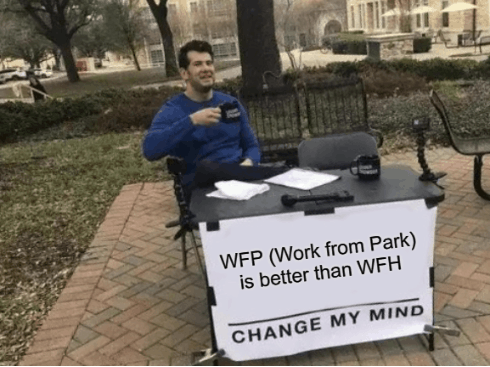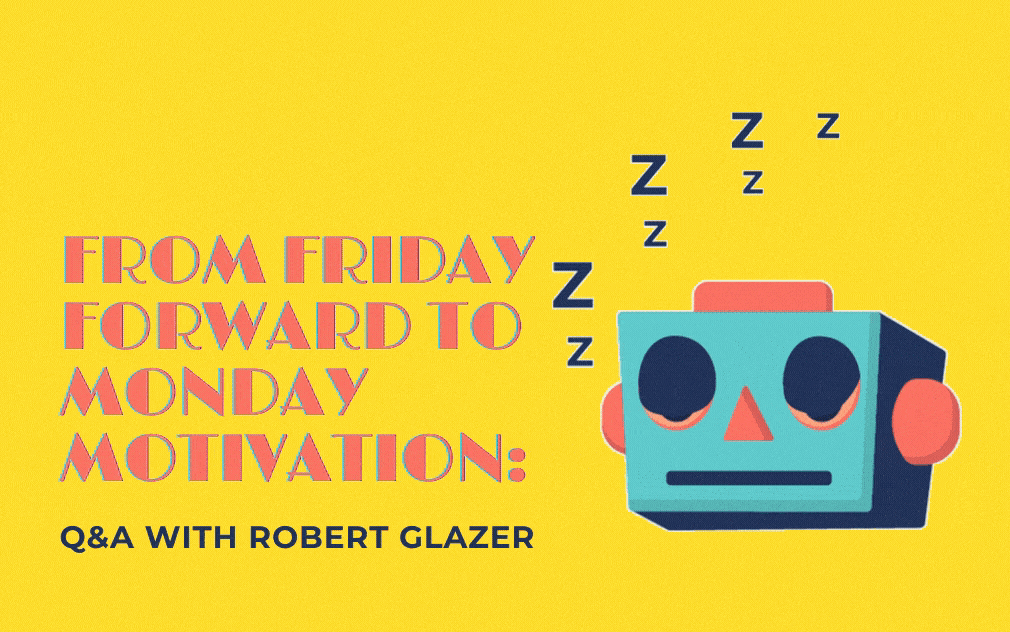Many of us start our Mondays wondering where our motivation will come from, and for some, whether we’ve even chosen the right career. Reference the (mostly) uplifting Twitter hashtag #MondayMotivation.
A recurring theme in my articles is the importance of aligning personal goals and values with not just your work but also your relationships and self-care. So I was pleasantly surprised, when I sat down to interview author Robert Glazer, to find that we shared similar thoughts on the same theme.
Robert is the CEO of Acceleration Partners and best-selling author of Elevate, a guidebook to performing to your fullest capacity in four key areas. If you find this Q&A with Robert useful, check out my other articles on motivation, time management, and habits.
Nir Eyal: Why did you write your book?
Robert Glazer: This really started a few years ago, when I had been trying to develop a proactive morning routine in my life, including reading something positive each morning. While I loved the routine, I found a lot of the books on motivation were a little too warm and fuzzy for my liking. I wanted something a bit more challenging and motivating, so I started writing about the types of topics and stories I wanted to read.
I started sending the messages to my team each Friday and wasn’t sure anyone even read them. However, to my surprise, employees began to respond and share that they were getting value from them and forwarding them to friends and family. I decided to open it to the public and it took off from there—today it’s read by 100,000 people in over 60 countries each week.
What became clear to me through this process was that there was an important middle ground between the negative stories that dominate the news headlines today and the more sugar-coated storytelling that tends to define the inspirational landscape. Friday Forward is about challenging people to examine their own potential and be honest about where they are falling short. The reality is most of most of us are living below our potential which is a hard truth to accept. I know I wish I had dug out of that hole earlier and I wanted to give people a framework to do the same.
Once Friday Forward gained a bigger following I pitched a compilation book to agents and the feedback was that publishers don’t like compilations. Then I met Rick Pascocello, who pushed me to write a book about the story and themes of Friday Forward. That examination led me to the concept of capacity building, which is the basis of Elevate.
NE: You’ve done some fascinating research. From what you’ve learned, what surprised you the most?
RG: I’m not alone in thinking burnout is one of the biggest challenges in the professional world. Gallup says 67 percent of workers have felt it at least some of the time. I know this from experience—early in my career I burned myself out multiple times, even landing in the hospital in 2009 after a panic attack.
What surprised me is that I came to find alleviating burnout doesn’t mean scaling back our workload, it’s more about reallocating our energy. Often, it just means we have to do more of the right things and say no to others—quality is a bigger factor than quantity.
I see many people today running fast in a direction in life without stepping back to understand who they are, where they are going and what they really want most. Think about the young professional who’s chasing a big-money job in an industry they hate, or the successful business owner who’s financially secure but estranged from their spouse and children. We can do a lot of damage to ourselves, and the people closest to us, if we don’t take stock of what’s actually important and then align our lives to pursue those things.

When you think about successful long-term companies, almost all of them have a clear vision and values. The same is true for people. When I really articulated my purpose and core values for the first time so many things in my life made sense—including why I was bored and disengaged in school, or even when I would be asked to clean my room as a kid and would rearrange it instead. I was able to realign my life and business around my strengths and what was most important to me.
We just don’t take enough time to step off the hamster wheel and design the life we really want. Ask yourself: what types of environments make you feel energized, and which ones leave you drained? What work would you do for free? What impact do you want to make on others? By starting there, you can begin to get a sense of where you should focus your limited time and energy.
NE: What lessons should people take away from your book regarding how they should design their own behavior or the behavior of others?
RG: I’ll focus on three crucial things: setting goals, getting outside your comfort zone and evaluating relationships.
Most people are setting goals arbitrarily—they just put together a bunch of to-dos that will make them feel accomplished, but don’t build toward anything that is unified. I used to hit all my quarterly and annual goals, but they move me in a singular direction.
Instead, people should start with the end in mind, long-term goals—five year, 10-year or lifetime goals—and then make annual and quarterly goals that build towards those outcomes. Most importantly, those long term goals should align to your values and what you want most.
We also need to do things regularly that scare us a bit; there is rarely growth in comfort. Because humans have a need to focus on survival for so much of our existence, things like fear, and fight-or-flight responses are hardwired into us, even though they aren’t as useful anymore. Having a fear-response to something as simple as signing up for a 5K or traveling to a new country is natural, but we need to rewire our brains to understand that pushing outside our comfort zone and trying things that are “scary” is a critical part of growth.

NE: Writing a book is hard. What do you do when you find yourself distracted or going off track?
RG: Writing takes a lot of uninterrupted time, which is hard for anybody to find. I used the same strategy for my writing as I do for the rest of my schedule which is a tactic called time blocking. My calendar reflects my priorities, so I proactively schedule time for everything I need to do—writing, meetings, even personal things like time for family and exercise. This is the best way to guarantee that, whatever was going in my week, I set aside time to work on Elevate. (Editor’s note: see the free schedule maker tool we built.)
Another tip I’ve found useful is to recognize which parts of the day are most productive for me for certain types of work. For example, I know I’m most energized and cognitively sharp in the morning, so I blocked off time for writing and editing early in the morning and hold off most meetings until after lunch.
The other thing I do when faced with a large project or a big goal is to break it down into all the smaller tasks or dominoes that need to get done to hit the end goal. I then schedule those tasks into my schedule and focus on the parts, rather than being overwhelmed by the whole.
NE: What’s one thing you believe that most people would disagree with?
RG: I don’t believe there is a universally great company culture, and any business that claims to be a great place to work for everyone isn’t being honest with itself. Employees want to be paid fairly and treated with respect, but those factors are not what defines a great culture.
Great companies have clearly a defined view supported by differentiated values and a clear vision. What gets businesses into trouble is when they try to appeal to everybody with broad mission statements and down-the-middle values like “honesty,” or “integrity.” Honesty and integrity should be table stakes for the people at your company, not the values that set your organization apart from others.
The best companies are, by default, not great for everyone; they excel by finding people that align with their principles. If you are a hyper competitive leader who likes to play win-lose games, you will attract people who want to be in that system if you are honest about it. But don’t pick “teamwork” as a core value and pretend that’s what you value. Pick a core value such as “results-oriented,” and align your compensation accordingly.

NE: What’s your most important good habit or routine?
NE: What’s the most important takeaway you want people to remember after reading your book?
- Spiritual: who we are and what we want; our purpose and core values
- Intellectual: how we plan and execute; learning, goal-setting, habits
- Physical: our health and well-being; how stay energized even in challenging situations
- Emotional: how we manage our emotional reactions and build positive relationships
We need to attend to all four of these in order to keep moving forward—if you are weak in one of the four, it will impact the other areas and hold you back.
A person who has the ambition, talent and energy to pursue a goal, but who has low emotional capacity and crumbles under the slightest adversity, will struggle to achieve at a high level. The same is true for a person who is brilliant, resilient and healthy, but has no idea what they actually want most.
Even the highest-performing people have to keep working on each area and identify where they are weakest at any given moment. Everybody who reads Elevate should come away with a sense of which area(s) may be holding them back and have immediate steps they can take to address and improve that element of capacity.
NE: Are you working changing any bad habits?
NE: What one product or service has helped you build a healthy habit?
RG: For sure, it’s SaneBox, an incredible tool that uses machine learning to help keep your inbox clean and filter out emails that you don’t need to read in an urgent matter. It also gives you the ability to snooze email and have them come back to your inbox at the right time; improve your focus; and remove distractions.
I hope this Q&A has got you thinking about how you might apply capacity building and Robert’s other ideas in your own life so you can look forward to your next Monday morning.
Related Articles
- Schedule Maker: a Google Sheet to Plan Your Week
- Habit Tracker Template in Google Sheets
- The Ultimate Core Values List: Your Guide to Personal Growth
- Timeboxing: Why It Works and How to Get Started in 2024
- An Illustrated Guide to the 4 Types of Liars
- Hyperbolic Discounting: Why You Make Terrible Life Choices
- Happiness Hack: This One Ritual Made Me Much Happier

